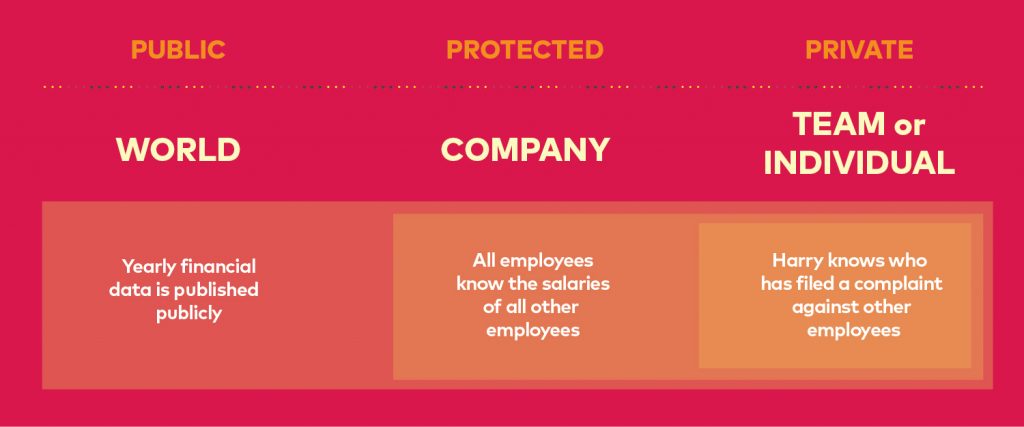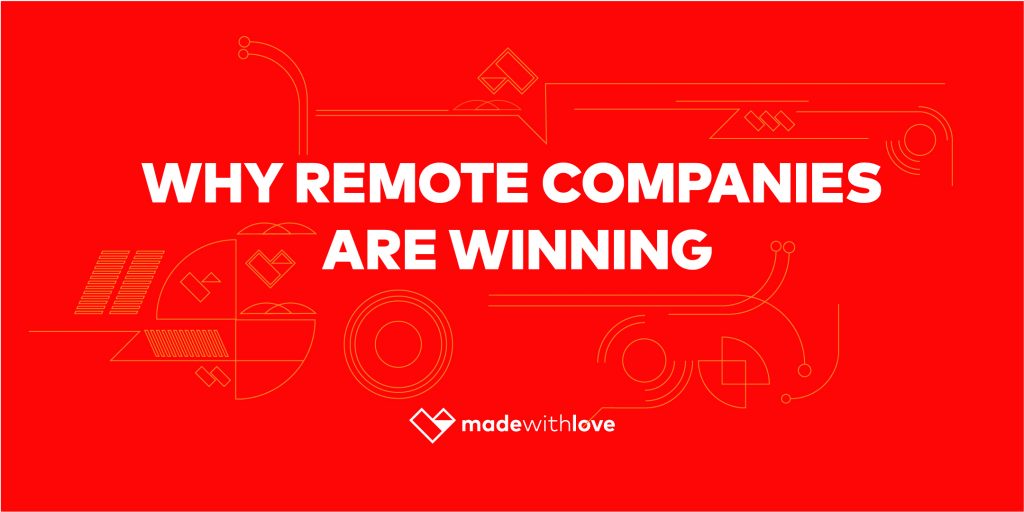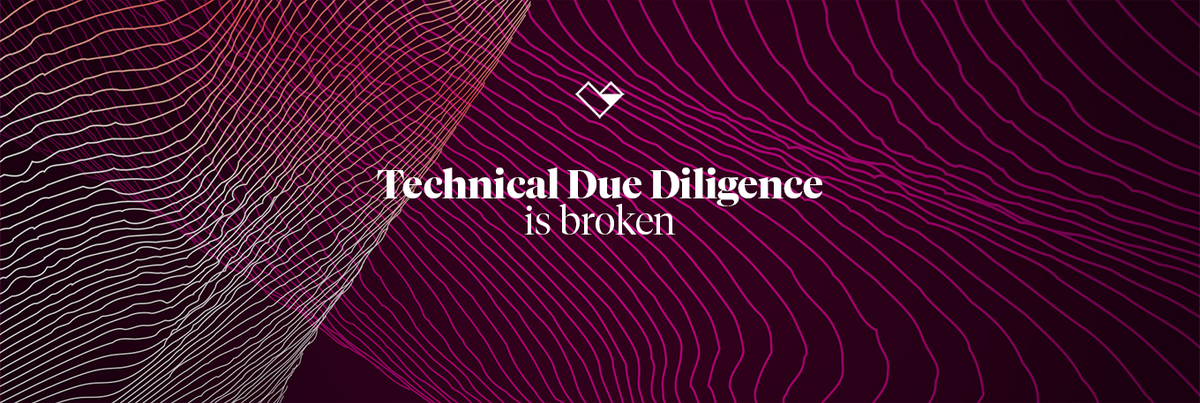Although we have employees in 7 countries — not bad for 20 people! — madewithlove is not a remote-first company. Yes, we work remotely, but there are 6 traits that allow us to be a successful remote company. We are a knowledge-first company.
What is a knowledge-first company?
A knowledge-first company is one that prioritizes the sharing of knowledge within their organization. They realize this is essential to success in the markets of tomorrow. The traditional solutions of organizational structure solve issues with power (decision making, strategy, et cetera), responsibility (ownership and scope), and information flow (sharing of knowledge and transparency). The industry titans of the future will update their structure and mindset to focus on the flow of information. This is especially apparent in traditional industries and hierarchies that are digitizing and becoming agile. Often, processes are implemented but the culture does not shift.
Read more about the tools we use for working remotely
Why is knowledge-first essential?
By recognizing that knowledge must be at the center of an organization and its structure, a company reduces its risk and allows for better decision making at all levels of hierarchy. Risk is mainly mitigated because procedures are clearly documented. This has two effects. First, information cannot be lost due to the absence of a key team member. Second, bad actors or malicious employees can be more rapidly identified since their working procedures are no longer opaque. Better decision making can occur because of increased transparency. Additionally, if responsibility is pushed downwards in the organization, then decision making speed is also increased. This becomes possible since all employees have the information necessary to make complex decisions confidently.
Traits of a knowledge-first company
1. Default towards public
It is naturally necessary to limit access to some information but most organizations default towards private when instead they should make strong efforts to shift towards public. In recent years, this has become more common as companies start to share their processes and procedures publicly. Some companies even provide salary calculators to create broader transparency about market rates. Almost all information in a knowledge-first company is protected instead of private.

2. It’s playtime
Because knowledge is so important, an organization needs to allow workers time to explore and document that knowledge. Creating space for ideating and sharing can be protected in many ways such as 10% time or company-wide meetingless days. Consistent space and time to shift to an open mode is essential to creative insights.
Try to establish as free an atmosphere as possible. — John Cleese
3. Storytellers unite
Taking time to formulate thoughts into useful, shareable chunks is hard. Hiring for good communication and writing skills is essential. Every member of the organization should feel confident that their ideas can be conveyed properly and thus considered. The role of storyteller is one that belongs to everyone, not just the CEO.
4. Fail away, fail away
Analyzing failures is a key way to learn. Disseminating the lessons from those failures is hard. In many industries, taking time to blamelessly review where improvements can be made and then modify behavior is necessary to overcoming failure. This increases psychological safety which will encourage creativity and knowledge flow. The learnings should be shared internally and preferably externally too.
5. No, I will not help you
In situations where information is requested and whenever time allows, employees should take care to document before helping. Instead of responding directly, create new content and share the content. This ensures that knowledge is spread to all members of the organization rather than to only the requestor.
Another example of this policy in practice comes from responses to requested data. Whenever data is requested, the team that provides it should begin to publish the data by default. Switching from a pull model to a push model will make information requests more efficient since the data is always available.

6. Question taxonomy
Organization of information is never perfect and as knowledge grows, it’s necessary to reevaluate the existing structure. Employees need to have authority to make updates and even restructure content themselves. If the information is not easily browsed, then it won’t be referenced. The taxonomy must be understood by all.
How does madewithlove rate?
- Transparency: We are very good at defaulting towards protected and shifting towards public. We have an opportunity to improve by open sourcing more tools.
- Creative time: We have mandatory 10% time every Friday afternoon. It’s ingrained in the culture that time spent here is valuable and productive.
- Writing skills: Written communication is tested during hiring. We have an internal blog, formal editing process, and encourage posts be published to our blog.
- Feedback: We spend a lot of energy on feedback and learning from our mistakes. We have several types of structured feedback, both planned and unplanned.
- Documentation: This will never be perfect, but we do fairly well at documenting answers to problems. We aren’t as strict as we could be and sometimes information is lost in a Zoom call that doesn’t have a recap. There is room to improve. One thing we’ve noticed is that it’s difficult for new employees to feel confident enough to fill in the gaps.
- Taxonomy: We regularly evaluate and restructure our internal documentation. It’s important to have flexibility but change management is important. Too many changes in too short a time could be problematic. It’s helpful to have good search here and we are happy that Notion just recently released an updated search to help with this.
Your organization can become knowledge-first
The main reason that companies struggle with remote workers is that they are not knowledge-first companies. Remote work is rarely the problem — it shines a spotlight on dysfunction. Do you need help becoming a knowledge-first company? Is there a trait I missed or got wrong? Do you agree with what I’ve written?
Please let us know on twitter:
Although we have employees in 9 countries — not bad for 25 people! — madewithlove is not a remote-first company. Yes, we work remotely, but there are 6 traits that allow us to be successful. We are a knowledge-first company.https://t.co/AyOtHy6wKB pic.twitter.com/DFbp272bvV— madewithlove (@madewithlove) February 5, 2020
Embedded JavaScript
Workshop: Why Remote Companies Are Winning

We are organising a workshop on working remote: Why Remote Companies are Winning. This 4-hour workshop will take place in Leuven, Belgium on the 5th of March. Interested in more?
What will you get out of it?
- 4 hours of interactive coaching by one of our experts
- Knowledge about how to successfully work remotely with your colleagues and clients
- Insights on leadership, processes, and communication
- Meeting like-minded people from the industry
- Snacks and drinks during the break
- Your specific questions answered










Member discussion